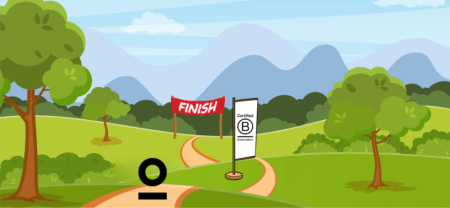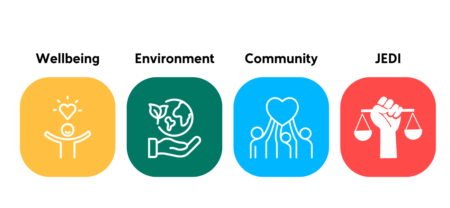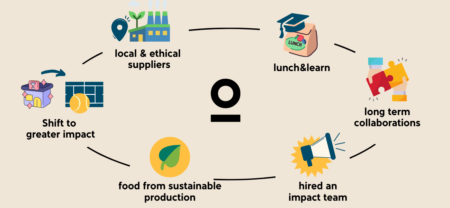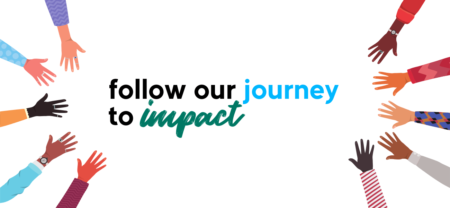25 Sep 2023 . 11 min read
TERO: Our Journey to Impact

What is an Impact Strategy?
An Impact Strategy is a holistic approach that adds different dimensions to a traditional business model, considering also the human, environmental, sustainable and social aspects. Since the integration of Tero, People First and Knokke Out under the Tero Group, we embarked on a journey in which we defined Impact as part of our core strategy. The final objective is to have a positive impact on society.
We know that an Impact Strategy is a continuous process in which each small step in the right direction helps us reach the goal: To double our impact by 2027, considering a perspective of sustainability in all our projects, and guided by our company values of passion, commitment, respect, authenticity in all that we do.

We are committed to go beyond nice words and intentions, and have already implemented several actions to bring all these down to earth and into concrete results.
TERO’s Journey to Impact: How it all started

The usual path for existing companies who want to operate with an Impact Model is to go through a 3-stage transition: The starting point is a traditional business model, in which Impact is not considered and companies don’t care. The first transformation is to switch to a sustainable and responsible model, focused on mitigation and working to avoid having a negative impact. And the final stage is to work towards an Impact Model, in which the final objective is to do good while aiming for profitability, combining growth with a positive impact on society and the environment.
When Tero, Knokke Out and People First merged under TERO Family, Knokke Out and People First worked under a more traditional business model, while Tero brought the culture of a responsible business model. But with the merger came the decision of shifting to an Impact Strategy, considering it as a long term project, subject to a constant evolution.
Tero’s mission is to provide unforgettable experiences, either through unusual team building events, sporting events, unique venues to rent, or offering delicious local food in the group’s restaurants and catering service. So considering Impact Strategies, the activities developed by Tero are quite diverse, so some will be easier to adapt to it, and some others more challenging.
But the crucial point is to have a strong decision to include the Impact dimension in all the projects and in all the company levels. That’s why, in order to coordinate the whole process, Tero has a Chief Impact Officer.

The forces behind TERO’s Impact Strategy
The main motivation behind pushing an Impact Strategy at Tero was internal, and was born from a strong belief and conviction that working towards having a positive impact is the right way to proceed into the future. We are a family business looking at the long term, and this is aligned to Tero’s mission, vision and values.
In order to succeed in the implementation of the Impact strategy, everyone must feel a part of it. It’s key to engage the whole company at all levels, from shareholders, management, and employees, to clients, partners and providers.
Besides Arthur Lhoist as Chief Impact Officer, among the 165 employees there are ambassadors of the impact strategy. Having everyone aligned to the values we fight for, and committed to this strategy helps to boost engagement, as it gives purpose to daily work. There are 4 impact groups led by employees, working bottom up on different areas to improve: Wellbeing, Environment, Community and JEDI (justice, equity, diversity and inclusion).

And along with the internal self-motivation that was the initial impulse to push Impact, there are also external forces pointing at this direction. There are many clients who now look to engage with sustainable companies, and take this into account when selecting their providers. As an example, some customers ask for their events to be Carbon neutral, and more and more companies are looking for more impactful or inclusive team building activities. Covid also accelerated this trend, as many organisations started planning their events locally, trying to avoid travel as much as possible.
So this approach also makes sense from a business point of view. Many of our clients choose to work with us because they want to be part of the change. And although as a medium size company Tero is not subject to regulations around sustainability, Impact is also a proactive strategy in order to anticipate and be ahead of time, knowing that at some point there will be more requirements and the group will be ready to comply with these future regulations.
Impact strategy on day to day
The Impact Strategy is a constant journey, in which there’s always room for improvement. Nevertheless, we already deployed several initiatives, and are working on many more that make us proud. Some of them are:
- The formal incorporation of the social and environmental dimensions to the legal business statute.
- We hired a Junior Impact Analyst to work together with the CIO in the implementation of the Impact Strategy.
- Knokke Out Waterloo, one of our most iconic venues, was turned from a nightclub to a sports club as part of our shift in our strategy to promoting well-being, not only in the workplace, but also on a daily basis for our BtoC customers.
- The food supply chain was optimised to work with organic ingredients coming from our local suppliers and from our farms going straight into our restaurants.
- We are developing an environmental management system (aimed to be launched by the end of 2023), which includes the objective of monitoring and optimising the use of energy and water in all premises of the company, and the generalisation of recycling practices.
- The recruitment and onboarding process of the company was updated to integrate the impact dimension.
- A new catalogue of Team Building activities is in process of development, which will consider the impact strategy.
- We will be moving soon into our new offices, designed to be more sustainable and encourage collaboration.
- On the Marketing side, we are producing merchandising with recycled materials.
- Relocation of activity hosts/monitors and chefs: They used to travel to the different locations for events, and will now be based locally as much as possible, to reduce logistics and transportation.
- Every two months, we organize a Lunch & Learn event for employees with the aim of involving as many company collaborators as possible. It focuses on various topics related to impact, with the goal of engaging the entire company.

And together with these internal initiatives, we have the collaboration of key partners who help us achieve some of our goals. TELOS Impact is a fundamental ally in the planning of the impact strategy, and the methodology to implement it. In order to keep our targets real, we work together with Tapio to measure Carbon emissions and in our overall CO2 strategy, and with Shayp to improve the water management and efficiency in all Tero’s premises. And Air was the creative agency that helped us with the branding and storytelling for the impact strategy.

Tero’s Impact Model towards the future
Looking ahead, there are key milestones for Tero’s Impact Strategy in the near future: becoming a certified B Corporation, and getting the Green Key Label for the lodges.
But all these formal achievements, although they are a great parameter and formal recognition, are not the final objective of the Impact Strategy. They are milestones in the process of integrating a way of doing things in the company operations. The main challenge is to make impact integrated at all business levels, have it internalised in the company culture, and to bring all stakeholders around this and have them as part of the journey. On top of this, another objective of the Impact Model is to raise a voice and inspire others in the hospitality sector in Benelux to have a positive influence and be a part of the change.
Working under an Impact business model is a long process and a constant journey, in which there are always things to improve. One year ago, we were very far from where we are now, but we still have a long way to go. So, having a clear strategy works as a guide and a direction where to point at, in order to take the right steps to have a positive impact as a company.
